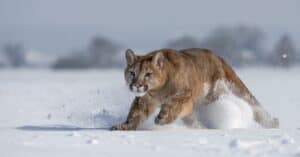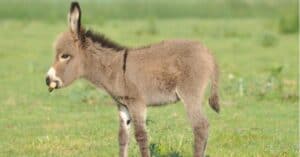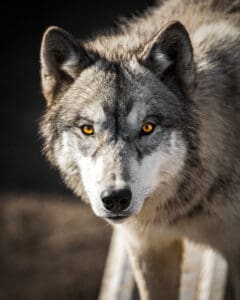Donkey vs Coyote: Who Would Win in a Fight?
@media (min-width: 481px) {
.mobile-top-content {
display: none;
}
}
#mobileTopContentCTACarouselControls { overflow: hidden; text-overflow: ellipsis; white-space: nowrap; }
.mobile-top-content .more { color: #fff; }
.mobile-top-content a { color: #fff; text-decoration: underline; }
.mobile-top-content a:hover { color: #fff; text-decoration: underline; }
@media (max-width: 480px) {
.mobile-top-content {
background-color: #06a10b;
color: #fff;
text-align: center;
/*height: 60px;
padding-top:5px;*/
font-size:80%;
/* display: block; */
margin: 0px -30px;
}
}
Donkeys are stocky farm animals that are used for labor throughout much of the world. They’re herbivorous creatures that are known for being stubborn. However, what happens when they’re faced with a grave threat in the form of a coyote? Although a match between a predator and an herbivore may seem to favor the former, let’s take a closer look at the donkey vs coyote matchup. We’ll show you which mammal has the best odds of winning this fight.
Comparing a Donkey and a Coyote
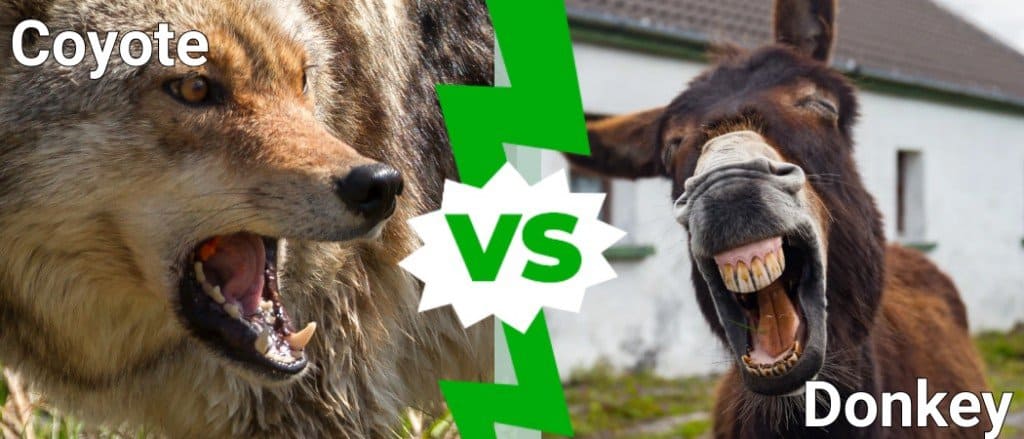
A-Z-Animals.com
| Donkey | Coyote | |
| Size | Weight: 400lbs – 570lbs Height: 35in – 57in Length 57in – 75in |
Weight: 15lbs – 45lbs Height: 24in – 26in at the shoulder Length: 30in – 35in |
| Speed and Movement Type | 15 mph | 35-40 mph |
| Bite Power and Teeth | – Unmeasured bite power – Their bite could potentially exert more force than a coyote |
88 Bite Force Quotient (BFQ) 681 N bite power – 42 teeth 1.5-inch-long canines – Teeth used to grip and tear enemies. |
| Senses | – Good sense of smell, but not great. – Wide field of vision with both monocular and binocular vision and good night vision – Amazing hearing that lets them hear creatures from miles away. |
– Great vision, including low-light and peripheral vision. – Sense of smell is similar to dogs – Good sense of hearing that allows them to hear up to a quarter of a mile |
| Defenses | – Size – Aggressiveness |
– Speed – Senses help it avoid trouble |
| Offensive Capabilities | – Will land powerful kicks on enemies – Can bite and cause severe injuries |
– Strong bite that helps them latch onto enemies and bring them to the ground. – May use sharp claws as a secondary form of offense |
| Predatory Behavior | – Herbivorous – Will react aggressively to foes. |
– Ambush predator when hunting alone – Hunt in packs for large prey using persistence predation |
The Key Factors in a Fight Between a Donkey and a Coyote
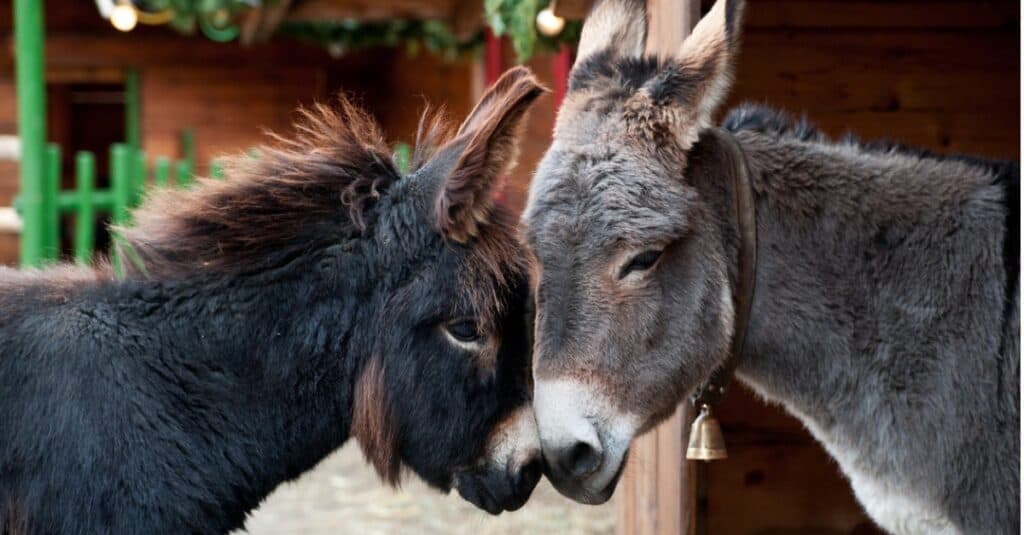
iStock.com/tepic
Considering that the donkey and the coyote are two such different animals, it can be hard to decide which creature wins a one-on-one fight. However, by examining key elements of each animal like their physical characteristics and their combat skills, we can effectively determine the winner of this fight. Take a look at six key features that determine if the coyote can take down a donkey!
Physical Features of a Donkey and a Coyote
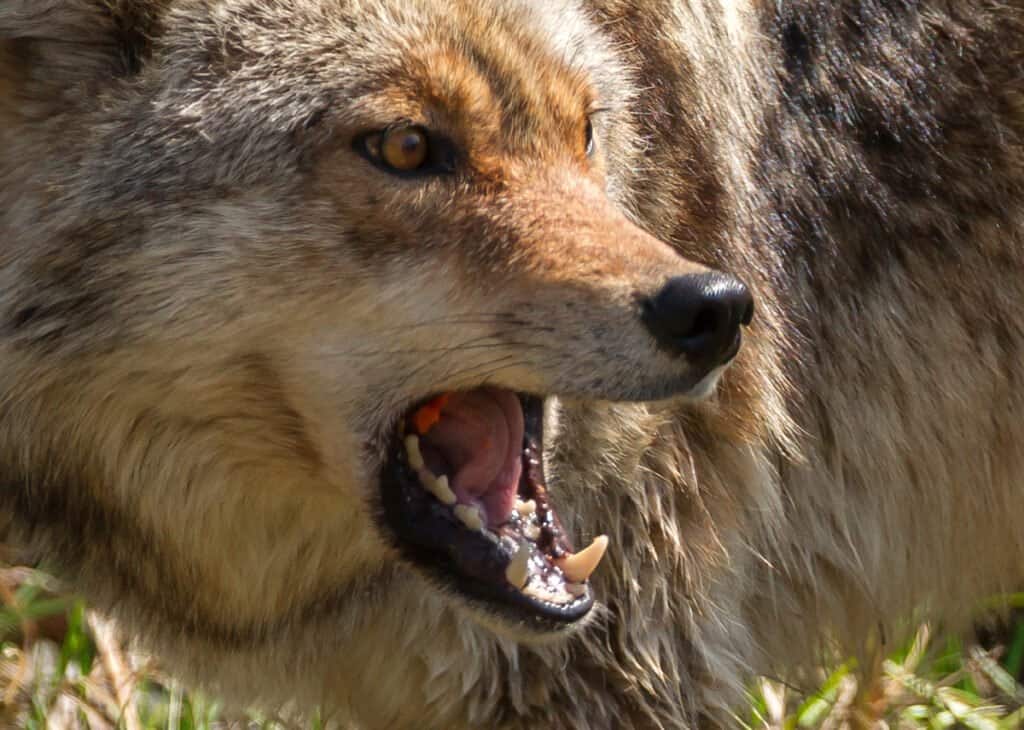
Derek R. Audette/Shutterstock.com
One of the best ways to figure out which animal has an advantage over the other is by breaking down various physical attributes. We have compiled five different pieces of information that we can use to show which animal is the better physical specimen. Take a look at this information and see for yourself!
Donkey vs Coyote: Size
Coyotes are related to dogs, but they’re smaller than a lot of breeds. In fact, they weigh a maximum of 45lbs and stand about 26in tall at the shoulder. They’re not very large animals.
Donkeys can be quite big, weighing up to 570lbs and standing 57in tall at the high end of the spectrum.
Donkeys have a size advantage over the coyote.
Donkey vs Coyote: Speed and Movement
Donkeys are rather stout animals, and they don’t move particularly fast. They can reach speeds of about 15mph when they need to chase after something or run from an enemy. Coyotes are swift, though. They have a top speed of 40mph, and that means they can double the speed of a donkey.
Coyotes have the advantage in terms of speed.
Donkey vs Coyote: Bite Power and Teeth
Coyotes do not have a particularly powerful bite. They don’t even bite as hard as many dogs. They do have 1.5-inch-long canines that can bite and tear their prey, though.
Donkeys’ teeth are made for biting and chewing plants, and no measure has been given for their bite force. However, they are known to bite and toss other animals and even small humans.
Coyotes have deadlier teeth but probably have a weaker bite than a donkey; this factor is a tie.
Donkey vs Coyote: Senses
Donkeys see well and have a great sense of hearing. They are made to detect threats, not find prey. Coyotes are made to find prey, though, so they have great vision in the day and night, a very good sense of smell, and hearing that makes it possible to hear creatures from a quarter-mile away.
Coyotes have the advantage in terms of senses.
Donkey vs Coyote: Physical Defenses
Coyotes are not large animals, so their biggest defensive benefits stem from their speed and senses. Donkeys are rather large animals, and that’s their key to defense.
Coyotes have the better physical defenses because they can get away from a fight and few animals can keep pace with them.
Combat Skills of a Donkey and a Coyote
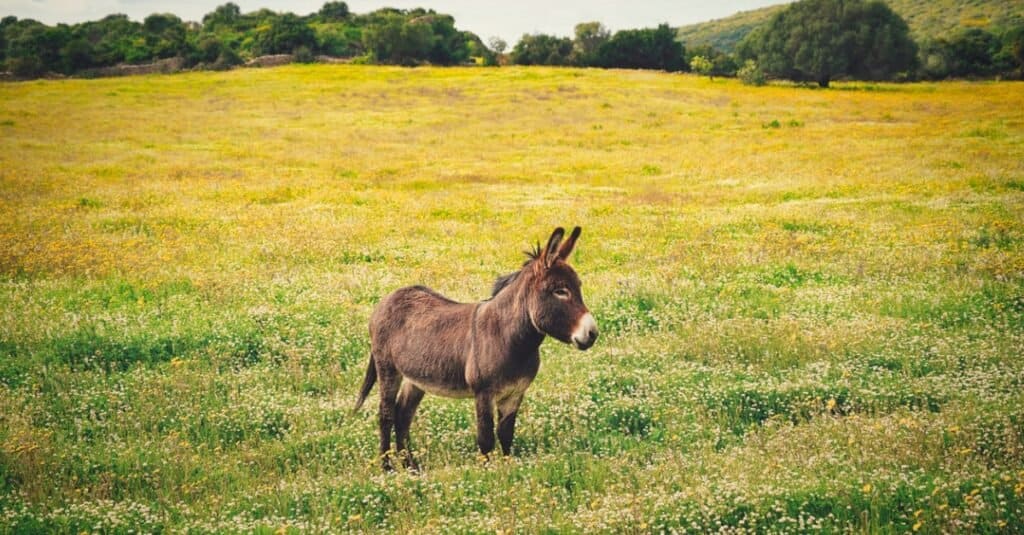
iStock.com/lo-chef
The coyote tends to hunt animals in packs, exhausting their prey before moving in for the kill. However, when they hunt alone, they will often seek to ambush and bite their prey in a vulnerable spot. Then, they drag the animal to the ground and kill it while using their claws to cut the other animal.
Donkeys have two major forms of attack. They can bite and thrash an animal around until it’s dead, or they can use a powerful kick to stun and kill their foes.
Both animals have impressive means to deal with threats.
What Are Key Differences Between a Donkey and a Coyote?
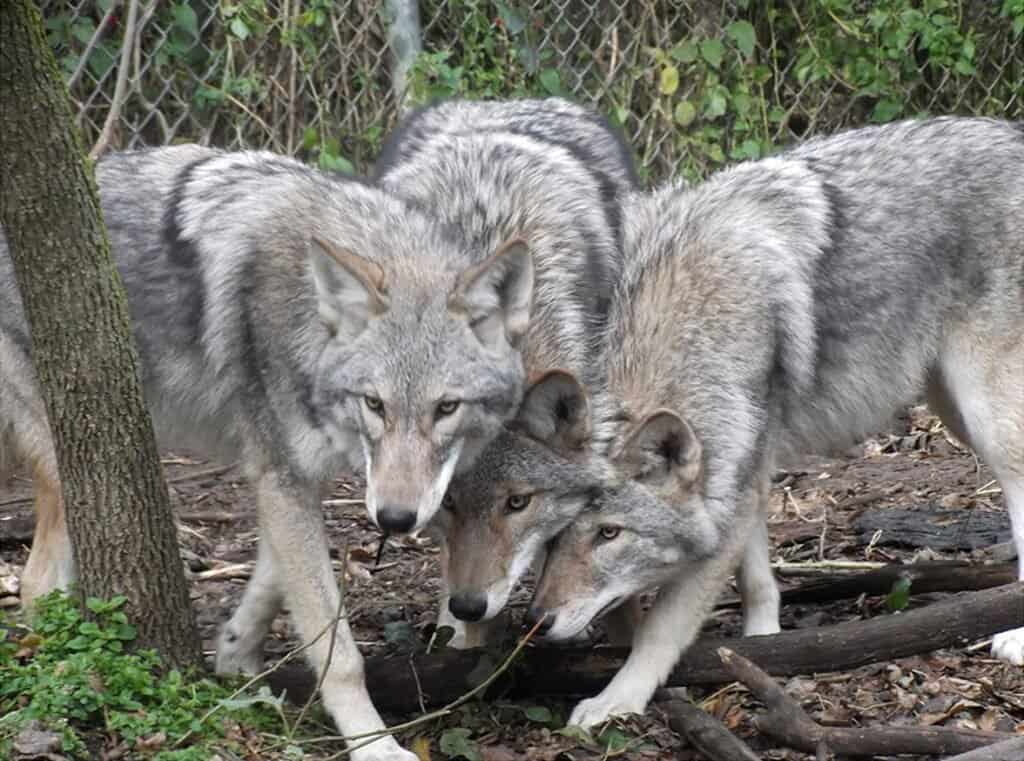
L. David Mech, Bruce W. Christensen, Cheryl S. Asa , Margaret Callahan, Julie K. Young / Creative Commons – License
Coyotes are related to dogs, and donkeys are related to horses. Coyotes are carnivores and donkeys are herbivores. Donkeys are far bigger than coyotes in most cases, and they’re stronger, too. However, coyotes are much faster than a donkey, capable of hunting down just about any animal.
Donkeys use their kicks and thrashing to kill but coyotes use a tearing bite to finish off their enemies. Both animals are rather aggressive; donkeys are very aggressive towards canines, probably because they understand the threat that they can pose to them.
Who Would Win in a Fight Between a Donkey and a Coyote?
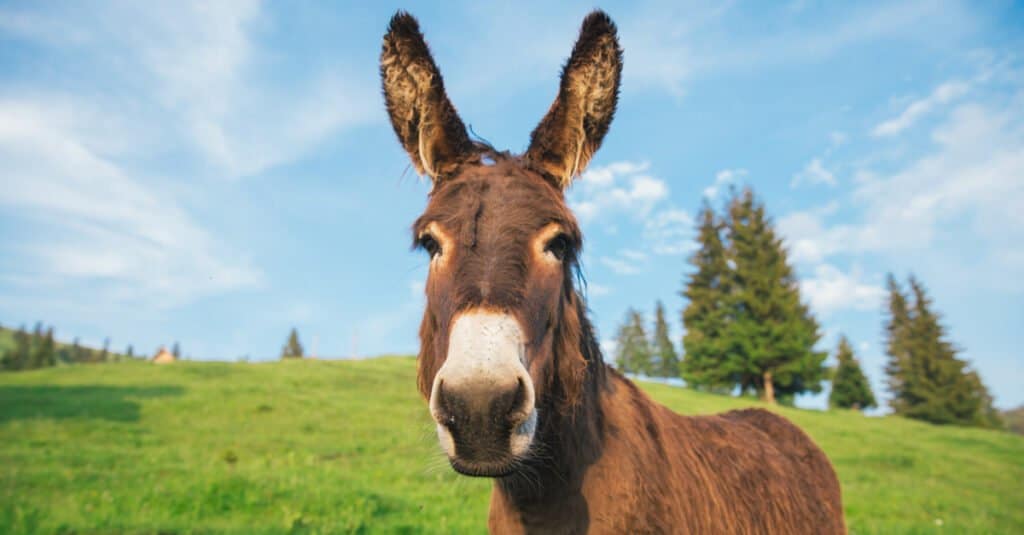
Angyalosi Beata/Shutterstock.com
A donkey would win a fight against a coyote. Although it may seem counterintuitive that a predator would lose to an herbivore, donkeys are known for being quite effective at fending off attacks from solo canines. Still, in a one-on-one fight, a coyote would likely stalk the donkey for some time and then attack.
The donkey would know its coming and locate it with its great vision and hearing. The coyote might be able to jump and bite the donkey’s neck or groin, but it will get a swift and powerful kick or a thrashing bite for its effort.
The size and power of the donkey ensure that the coyote would need to spend significant amounts of time and energy to bring down the larger animal. Donkeys just need one crunching bite on the head, neck, or limbs to disable to coyote. Likewise, a single kick could potentially kill the coyote.
With those things in mind, it seems a lot more likely that a donkey is walking away from this fight compared to a coyote. In fact, we know this outcome is very likely to occur because donkeys are often kept as guard animals on farms in areas with coyotes. Donkeys will use their size to scare off coyotes or kill them outright.
More from A-Z Animals
.more-snake-card-image { max-height:140px !important; }
@media (min-width: 481px) {
.mobile-top-content {
display: none;
}
}
#mobileTopContentCTACarouselControls { overflow: hidden; text-overflow: ellipsis; white-space: nowrap; }
.mobile-top-content .more { color: #fff; }
.mobile-top-content a { color: #fff; text-decoration: underline; }
.mobile-top-content a:hover { color: #fff; text-decoration: underline; }
@media (max-width: 480px) {
.mobile-top-content {
background-color: #06a10b;
color: #fff;
text-align: center;
/*height: 60px;
padding-top:5px;*/
font-size:80%;
/* display: block; */
margin: 0px -30px;
}
}
Donkeys are stocky farm animals that are used for labor throughout much of the world. They’re herbivorous creatures that are known for being stubborn. However, what happens when they’re faced with a grave threat in the form of a coyote? Although a match between a predator and an herbivore may seem to favor the former, let’s take a closer look at the donkey vs coyote matchup. We’ll show you which mammal has the best odds of winning this fight.
Comparing a Donkey and a Coyote

A-Z-Animals.com
| Donkey | Coyote | |
| Size | Weight: 400lbs – 570lbs Height: 35in – 57in Length 57in – 75in |
Weight: 15lbs – 45lbs Height: 24in – 26in at the shoulder Length: 30in – 35in |
| Speed and Movement Type | 15 mph | 35-40 mph |
| Bite Power and Teeth | – Unmeasured bite power – Their bite could potentially exert more force than a coyote |
88 Bite Force Quotient (BFQ) 681 N bite power – 42 teeth 1.5-inch-long canines – Teeth used to grip and tear enemies. |
| Senses | – Good sense of smell, but not great. – Wide field of vision with both monocular and binocular vision and good night vision – Amazing hearing that lets them hear creatures from miles away. |
– Great vision, including low-light and peripheral vision. – Sense of smell is similar to dogs – Good sense of hearing that allows them to hear up to a quarter of a mile |
| Defenses | – Size – Aggressiveness |
– Speed – Senses help it avoid trouble |
| Offensive Capabilities | – Will land powerful kicks on enemies – Can bite and cause severe injuries |
– Strong bite that helps them latch onto enemies and bring them to the ground. – May use sharp claws as a secondary form of offense |
| Predatory Behavior | – Herbivorous – Will react aggressively to foes. |
– Ambush predator when hunting alone – Hunt in packs for large prey using persistence predation |
The Key Factors in a Fight Between a Donkey and a Coyote

iStock.com/tepic
Considering that the donkey and the coyote are two such different animals, it can be hard to decide which creature wins a one-on-one fight. However, by examining key elements of each animal like their physical characteristics and their combat skills, we can effectively determine the winner of this fight. Take a look at six key features that determine if the coyote can take down a donkey!
Physical Features of a Donkey and a Coyote

Derek R. Audette/Shutterstock.com
One of the best ways to figure out which animal has an advantage over the other is by breaking down various physical attributes. We have compiled five different pieces of information that we can use to show which animal is the better physical specimen. Take a look at this information and see for yourself!
Donkey vs Coyote: Size
Coyotes are related to dogs, but they’re smaller than a lot of breeds. In fact, they weigh a maximum of 45lbs and stand about 26in tall at the shoulder. They’re not very large animals.
Donkeys can be quite big, weighing up to 570lbs and standing 57in tall at the high end of the spectrum.
Donkeys have a size advantage over the coyote.
Donkey vs Coyote: Speed and Movement
Donkeys are rather stout animals, and they don’t move particularly fast. They can reach speeds of about 15mph when they need to chase after something or run from an enemy. Coyotes are swift, though. They have a top speed of 40mph, and that means they can double the speed of a donkey.
Coyotes have the advantage in terms of speed.
Donkey vs Coyote: Bite Power and Teeth
Coyotes do not have a particularly powerful bite. They don’t even bite as hard as many dogs. They do have 1.5-inch-long canines that can bite and tear their prey, though.
Donkeys’ teeth are made for biting and chewing plants, and no measure has been given for their bite force. However, they are known to bite and toss other animals and even small humans.
Coyotes have deadlier teeth but probably have a weaker bite than a donkey; this factor is a tie.
Donkey vs Coyote: Senses
Donkeys see well and have a great sense of hearing. They are made to detect threats, not find prey. Coyotes are made to find prey, though, so they have great vision in the day and night, a very good sense of smell, and hearing that makes it possible to hear creatures from a quarter-mile away.
Coyotes have the advantage in terms of senses.
Donkey vs Coyote: Physical Defenses
Coyotes are not large animals, so their biggest defensive benefits stem from their speed and senses. Donkeys are rather large animals, and that’s their key to defense.
Coyotes have the better physical defenses because they can get away from a fight and few animals can keep pace with them.
Combat Skills of a Donkey and a Coyote

iStock.com/lo-chef
The coyote tends to hunt animals in packs, exhausting their prey before moving in for the kill. However, when they hunt alone, they will often seek to ambush and bite their prey in a vulnerable spot. Then, they drag the animal to the ground and kill it while using their claws to cut the other animal.
Donkeys have two major forms of attack. They can bite and thrash an animal around until it’s dead, or they can use a powerful kick to stun and kill their foes.
Both animals have impressive means to deal with threats.
What Are Key Differences Between a Donkey and a Coyote?

L. David Mech, Bruce W. Christensen, Cheryl S. Asa , Margaret Callahan, Julie K. Young / Creative Commons – License
Coyotes are related to dogs, and donkeys are related to horses. Coyotes are carnivores and donkeys are herbivores. Donkeys are far bigger than coyotes in most cases, and they’re stronger, too. However, coyotes are much faster than a donkey, capable of hunting down just about any animal.
Donkeys use their kicks and thrashing to kill but coyotes use a tearing bite to finish off their enemies. Both animals are rather aggressive; donkeys are very aggressive towards canines, probably because they understand the threat that they can pose to them.
Who Would Win in a Fight Between a Donkey and a Coyote?

Angyalosi Beata/Shutterstock.com
A donkey would win a fight against a coyote. Although it may seem counterintuitive that a predator would lose to an herbivore, donkeys are known for being quite effective at fending off attacks from solo canines. Still, in a one-on-one fight, a coyote would likely stalk the donkey for some time and then attack.
The donkey would know its coming and locate it with its great vision and hearing. The coyote might be able to jump and bite the donkey’s neck or groin, but it will get a swift and powerful kick or a thrashing bite for its effort.
The size and power of the donkey ensure that the coyote would need to spend significant amounts of time and energy to bring down the larger animal. Donkeys just need one crunching bite on the head, neck, or limbs to disable to coyote. Likewise, a single kick could potentially kill the coyote.
With those things in mind, it seems a lot more likely that a donkey is walking away from this fight compared to a coyote. In fact, we know this outcome is very likely to occur because donkeys are often kept as guard animals on farms in areas with coyotes. Donkeys will use their size to scare off coyotes or kill them outright.





